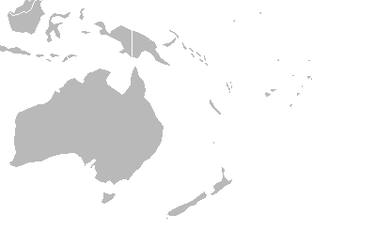Apia Samoa Temple
| Apia Samoa Temple | |||||
|---|---|---|---|---|---|

| |||||
| Number | 22 | ||||
| Dedicated | August 5, 1983 by Gordon B. Hinckley | ||||
| Site | 2 acres (0.8 hectares) | ||||
| Floor area | 18,691 sq ft (1,736 m2) | ||||
| Height | 75 ft (23 m) | ||||
| Preceded by | Atlanta Georgia Temple | ||||
| Followed by | Nuku'alofa Tonga Temple | ||||
| Official website • News & images | |||||
| |||||
Coordinates: 13°50′18.03839″S 171°47′0.909600″W / 13.8383439972°S 171.78358600000°W
The Apia Samoa Temple (formerly the Samoan Temple) was the 24th constructed and 22nd operating temple of The Church of Jesus Christ of Latter-day Saints (LDS Church). It was the first built in Samoa and the third to be built in Polynesia. After it was destroyed by fire, a new temple was built and dedicated on the same grounds.
History[]
The intention to construct a temple in Apia was announced by the LDS Church on October 15, 1977. A groundbreaking ceremony and site dedication were held on February 19, 1981, with church president Spencer W. Kimball giving the dedicatory prayer.
The temple was open to the public for tours July 19 to 30, 1983. Gordon B. Hinckley dedicated the new Apia Samoa Temple August 5, 1983, and rededicated it on September 4, 2005. The Apia Samoa Temple serves members from 20 stakes in American Samoa, and the islands of Upolu and Savai'i.
As of 2020, Meliula M. Fata is the temple president, with his wife, Pono, serving as temple matron.[3]
Fire and reconstruction[]

On July 9, 2003, a fire destroyed the temple.[4] Although the cause of the fire is unknown, it is believed to be construction related.[5] The fire occurred in the evening after workers had gone home. Firefighters from Faleolo International Airport were called in to help firemen from Apia fire station.[6]
One week later, on July 16, 2003, the First Presidency sent a letter to the people of the area telling them that the temple would be rebuilt. Three months later, on October 19, 2003, the site was rededicated and a groundbreaking ceremony was held. As part of the construction process, the church demolished a building on the property and built a new chapel across the street from the temple. On January 25, 2005, the angel Moroni statue that had survived the fire was placed on the spire of the new building.
Architecture[]
The original and the rebuilt temple use a classic modern design with a single spire, on a 2-acre (8,100 m2) site. The original temple was 14,560 square feet (1,353 m2), but with the rebuilding the total floor area is now 18,691 square feet (1,736.5 m2). The exterior of is finished with granite.
The temple has two ordinance rooms and two sealing rooms.
See also[]
- Comparison of temples of The Church of Jesus Christ of Latter-day Saints
- List of temples of The Church of Jesus Christ of Latter-day Saints
- List of temples of The Church of Jesus Christ of Latter-day Saints by geographic region
- Temple architecture (Latter-day Saints)
- The Church of Jesus Christ of Latter-day Saints in Samoa
References[]
- ^ Images of the different designs may be found here (new) and here (old)
- ^ "Find an LDS Temple: Temple Locations from Around the World", churchofjesuschrist.org, LDS Church
- ^ "Read about these 5 new temple presidents and matrons". Church News. March 19, 2020.
- ^ Swensen, Jason. "Samoan temple destroyed by fire", Deseret News, 10 July 2003. Retrieved on 27 March 2020.
- ^ "Samoan Latter-Day Saint Temple Destroyed", Firehouse, 11 July 2003. Retrieved on 27 March 2020.
- ^ "Temple burns", Samoa Observer, 15 September 2018. Retrieved on 27 March 2020.
External links[]
 Media related to Apia Samoa Temple at Wikimedia Commons
Media related to Apia Samoa Temple at Wikimedia Commons- Apia Samoa Temple Official site
- Apia Samoa Temple at ChurchofJesusChristTemples.org
- Temples (LDS Church) in Oceania
- 20th-century Latter Day Saint temples
- 21st-century Latter Day Saint temples
- Buildings and structures in Apia
- Religious buildings and structures in Samoa
- Rebuilt buildings and structures
- Religious buildings and structures completed in 1983
- Religious buildings and structures completed in 2005
- The Church of Jesus Christ of Latter-day Saints in Samoa
- 1983 establishments in Samoa
- Burned buildings and structures

